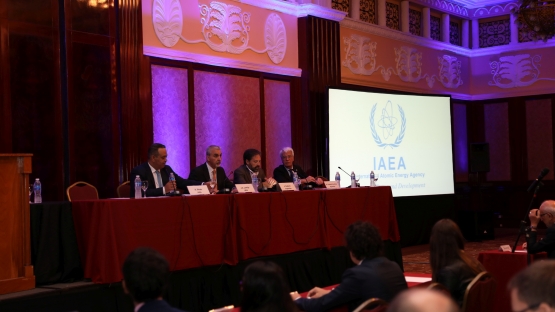Life-saving radioisotopes, innovative materials, education and new facts about cultural heritage are a few of the many benefits of research reactors. How to continue maximizing these benefits in a sustainable and effective way is under discussion this week at the International Conference on Research Reactors: Addressing Challenges and Opportunities to Ensure Effectiveness and Sustainability in Buenos Aires, Argentina. The conference aims to support national and international efforts in all areas related to research reactors.
“Interest in research reactors remains high, with good reason, considering the important role they play in our society,” said Juan Carlos Lentijo, IAEA Deputy Director General and Head of the Department of Safety and Security during the opening session of the conference.
Since the 1950s, research reactors have been centres of innovation and development for nuclear science and technology programmes around the world. These small nuclear reactors primarily generate neutrons — rather than power — for research, education and training purposes, as well as for applications in areas such as industry, medicine and agriculture. There are now 247 operating research reactors in 53 countries, and around 30 new research reactor programmes are being planned and developed.
“Research reactors have been playing an important part in many areas of our lives for decades,” said Julian Gadano, Undersecretary of Nuclear Energy in Argentina’s Ministry of Energy, during his opening remarks. “This conference is an opportunity for stakeholders across the field to exchange experiences and best practices to ensure society can continue to reap the benefits of research reactors in an effective and sustainable manner.”
With more than 350 participants, the conference, organized by the IAEA and National Atomic Energy Commission of Argentina (CNEA), is the largest gathering of the international research reactor community. It has brought together experts across the field, from operators and users to regulators, designers and suppliers.
Over the next five days, the participants will share experiences and discuss best practices related to seven topics: utilization and applications, operation and maintenance, new research reactor programmes, safety, security, fuel management and decommissioning, and common management considerations.
They will also address the main challenges related to research reactors, such as ensuring regulatory effectiveness, managing the ageing of facilities and staff, and enhancing utilization programmes and strategic planning. They will also explore the role of leadership and management, spent fuel management and infrastructure for new research reactor programmes.
“Feedback from the Agency’s activities indicates that ensuring the safety, security and sustainability of research reactors involves several challenges,” Lentijo said. “These challenges must be addressed, and this conference gives us an opportunity to do so.”
The conference, which is held every four years, is one of several IAEA activities supporting countries in addressing the opportunities and challenges related to research reactor programmes. Other examples highlighted by Lentijo include the IAEA’s Milestones approach for research reactor programmes and peer review services, as well as its support in areas, ranging from safety and security, to operations and utilization, as well as leadership, management and the fuel cycle. The IAEA also develops safety standards and organizes periodic meetings, seminars, symposia and training courses, as well as provides services in other areas of its mandate.





